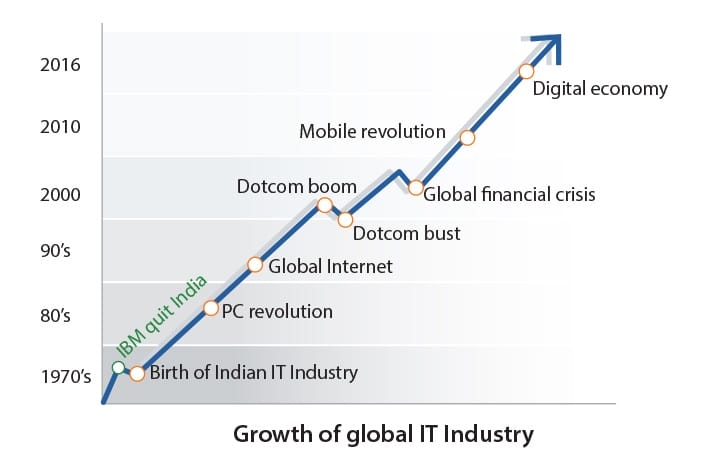Recently the US, UK, and Singapore governments have imposed various work permit curbs, designed to restrict the ability of foreign IT professionals from working in these countries. The stake-holders on both sides, i.e. western companies desperate for skilled technology talent to fuel their innovation goals, and offshore providers’ dependent on serving them are equally rattled by these recent developments.
While some short-term pain and disruption will be inevitable, as is the case with any regulatory change, I believe that we shouldn’t get caught up in the heat of the moment, and must think dispassionately about how this crisis can be creatively converted into an opportunity that can be mutually beneficial.
This is not the first time that a regulatory change or global event had a significant impact on the technology sector. Over the past four decades, along with a continuous stream of technology disruption, we have also witnessed some major changes in the regulatory framework, and all of them had a transformative impact on the IT sector.
The innate entrepreneurial and innovative nature of the industry helped it to weather these challenges, and emerge stronger and bigger than ever before. Let’s revisit some of these transformative moments in history:
Exit of IBM and birth of Indian IT industry
Those who are long in their tooth will probably remember this epochal moment in the 1970s, when thanks to the investment curbs and ownership restrictions of the government, many multi-national corporations including IBM and Coca-Cola packed up and left India. The vacuum created by IBM gave birth to Indian IT industry, and the rest is history. Many pioneers and global giants of the IT service industry took root in that era.
Rise of PC and platform Independence
The advent of the PC/workstation in the 80s along with the wide adoption of Unix and C, saw the emergence of platform independent software products and applications. The wide adoption of wintel standard, and the significant lowering of hardware and software costs led to explosive growth in PCs along with demand for custom software, which in turn has led to the emergence of a huge custom software industry, not only in western nations, but also in emerging economies such as India.
Start of the offshoring and outsourcing trend
The demand for custom software and the need to meet the maintenance, integration, and customization related services created a huge shortage of skilled manpower in countries like the US. As the American companies started looking offshore, availability of a pool of English speaking programmers made countries like India, Ireland, and Israel attractive choices. Just around this time, the liberalization of investment norms, favorable regulatory environment of the mid-80s, made India an attractive destination for IT outsourcing. An enabling policy framework and attractive incentives also enabled the growth of technology industry in Ireland and Israel. Many of these companies started off with providing low-end services such as maintenance, and gradually progressed to more value-added services such as developing customized software and applications.

Rise of the global Internet, Y2k, and Dotcom Boom
The breathtaking advances in networking and telecommunication technologies, coupled with the advent of graphical web browsers led to a phenomenal growth in internet usage in the early 90s. This has also coincided with globalization, the WTO trade deal, and removal of barriers for free movement of capital, people, and services across the world.
Taking advantage of the favorable regulatory environment, many western businesses including the likes of IBM have reentered India, and established sizeable operations to meet their global IT requirements. Parallelly the home-grown service providers have also expanded by leaps and bounds to serve the ever-expanding IT needs of western enterprises, and many of them have also established operations in these countries to be close to their customers. The Dotcom boom, and the need to fix applications and services impacted by the Y2K bug, fueled the growth of the industry for some time.
Mobile revolution, ecommerce, and digital disruption
As the global economy recovered from the dotcom bust, the next phase of the industry growth is fueled by the mobile revolution, the emergence of ecommerce giants, and the tremendous impact of disruption caused by emerging technology paradigms such as social and mobility. This sheer volume of cutting-edge innovation, and the resulting positive impact on productivity and economic growth was made possible by the collaborative and global nature of the technology industry.
Knowledge-driven digital economy needs distributed innovation
Over the past 40 years, the technology industry has successfully weathered many challenges, and played a huge role in fostering innovation and global economic growth. I believe that all stake holders must utilize this temporary setback to fundamentally transform themselves. The emerging digital economy which is predominantly knowledge-driven needs robust long-term policies and resolute action from all stake holders to fuel innovation-led growth:
- Western economies facing talent crunch must invest in long-term policies to enhance technology skills and capacity building
- Industry-academia partnerships must take the lead in identifying future needs, and develop long term programs to nurture the needed talent
- Businesses must prioritize which critical roles will be fulfilled by an offshore partner, and automate routine tasks
- The focus must be on value addition and not on cost arbitrage, which will make the place of origin irrelevant
- Develop a business model based on collaborative partnerships and not on vendor supplier model, and the service provider must aim to be a part of the customer’s value chain
- Restructure the resource pyramid and shape the market demand, by sending a clear signal that it is no longer adequate to have a narrow set of skills, but about the ability to create innovative solutions
- Service providers must build mature competencies in emerging technologies, and stay ahead of the curve in technology disruption
- Service providers must utilize their vast technology skills to build innovative products to serve the vast and burgeoning emerging economies and domestic markets instead of depending only on export led growth
I am an eternal optimist who always sees a silver lining in the dark clouds. I genuinely believe that the current hiccups are temporary, and it’s just a matter of time before nations realize that the benefits of open trade and free movement of capital, goods, services, and people far outweigh any potential short-term costs.
I am also very confident that with the right vision, strategy, and execution, the technology sector can certainly overcome these barriers and distributed innovation can fuel and sustain global economic growth for decades to come.





